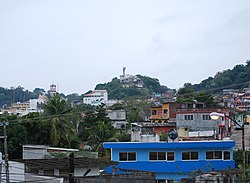Papantla de Olarte
| Papantla | |
|---|---|
| Town & Municipality | |
| Papantla de Olarte | |

Overview of Papantla with the Monument to the Volador in the background
|
|
| Location in Mexico | |
| Coordinates: 20°26′52″N 97°19′12″W / 20.44778°N 97.32000°WCoordinates: 20°26′52″N 97°19′12″W / 20.44778°N 97.32000°W | |
| Country |
|
| State | Veracruz |
| Founded | 13th century |
| Municipal Status | 1880 |
| Government | |
| • Municipal President | Jesús Cienfuegos Meraz |
| Area | |
| • Municipality | 1,199.26 km2 (463.04 sq mi) |
| Elevation (of seat) | 180 m (590 ft) |
| Population (2005) Municipality | |
| • Municipality | 152,863 |
| • | 51,716 |
| Time zone | Central (US Central) (UTC-6) |
| • Summer (DST) | Central (UTC-5) |
| Postal code (of seat) | 93400 |
| Demonym | papanteco |
| Website | (in Spanish) Site |
Papantla (Spanish ![]() ) is a city and municipality located in the north of the state of Veracruz, Mexico, in the Sierra Papanteca range and on the Gulf of Mexico. The city was founded in the 13th century by the Totonacs and has dominated the Totonacapan region of the state since then. This is the home of vanilla, which is native to this region, the Danza de los Voladores and the El Tajín archeological site, which was named a World Heritage Site. Papantla still has strong communities of Totonacs who maintain the culture and language. The city contains a number of large scale murals and sculptures done by native artist Teodoro Cano García, which honor the Totonac culture. The name Papantla is from Nahuatl and most often interpreted to mean "place of the papanes" (a species of crow). This meaning is reflected in the municipality’s coat of arms.
) is a city and municipality located in the north of the state of Veracruz, Mexico, in the Sierra Papanteca range and on the Gulf of Mexico. The city was founded in the 13th century by the Totonacs and has dominated the Totonacapan region of the state since then. This is the home of vanilla, which is native to this region, the Danza de los Voladores and the El Tajín archeological site, which was named a World Heritage Site. Papantla still has strong communities of Totonacs who maintain the culture and language. The city contains a number of large scale murals and sculptures done by native artist Teodoro Cano García, which honor the Totonac culture. The name Papantla is from Nahuatl and most often interpreted to mean "place of the papanes" (a species of crow). This meaning is reflected in the municipality’s coat of arms.
The area in which Papantla is found has been dominated by a number of pre-Hispanic cultures. The first known is that of the Olmec, with the Huastecs coming afterward. Evidence of these cultures can be found at nearby archeological sites such as Cempoala, El Tajin, San Lorenzo and Tres Zapotes. The settlement was founded around 1200, by various groups of Totonacs, some of whom migrated here after being pushed south by the Chichimecas and other groups coming from the fallen city of El Tajín. During the rest of the pre-Hispanic period the site belonged to the Pueblos del Totonacapan, dominated by Tuzapan, and paid tribute to the Aztec Empire.
...
Wikipedia

